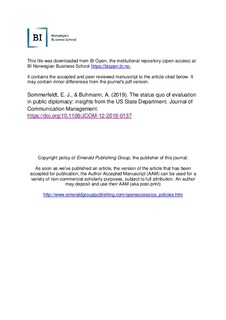The status quo of evaluation in public diplomacy: insights from the US State Department
Journal article, Peer reviewed
Accepted version
Permanent lenke
http://hdl.handle.net/11250/2633224Utgivelsesdato
2019Metadata
Vis full innførselSamlinger
- Publikasjoner fra CRIStin - BI [1015]
- Scientific articles [2181]
Sammendrag
Purpose In recent years, expectations for demonstrating the impact of public diplomacy programs have dramatically increased. Despite increased calls for enhanced monitoring and evaluation, what texts exist on the subject suggest the state of practice is grim. However, while the current debate is based mostly on practice reports, conceptual work from academics or anecdotal evidence, we are missing empirical insights on current views of monitoring and evaluation from practitioners. Such a practice-level perspective is central for better understanding factors that may actually drive or hamper performance evaluation in day-to-day public diplomacy work. The purpose of this paper is to update knowledge on the state of evaluation practice within public diplomacy from the perspectives of practitioners themselves. Design/methodology/approach This study assesses the state of evaluation in public diplomacy through qualitative interviews with public diplomacy officers working for the US Department of State – a method heretofore unused in studies of the topic. In total, 25 in-depth interviews were conducted with officers in Washington, DC and at posts around the world. Findings The interviews suggest that practitioners see evaluation as underfunded despite increased demands for accountability. Further, the results show a previously not discussed tension between diplomacy practitioners in Washington, DC and those in the field. Practitioners are also unclear about the goals of public diplomacy, which has implications for the enactment of targeted evaluations. Originality/value The research uncovers the perceptions of evaluation from the voices of those who must practice it, and elaborates on the common obstacles in the enactment of public diplomacy, the influence of multiple actors and stakeholders on evaluation practice, as well as the perceived goals of public diplomacy programming. No empirical research has considered the state of evaluation practice. Moreover, the study uses qualitative interview data from public diplomacy officers themselves, an under-used method in public diplomacy research. The findings provide insights that contribute to future public diplomacy strategy and performance management. The status quo of evaluation in public diplomacy: insights from the US State Department
